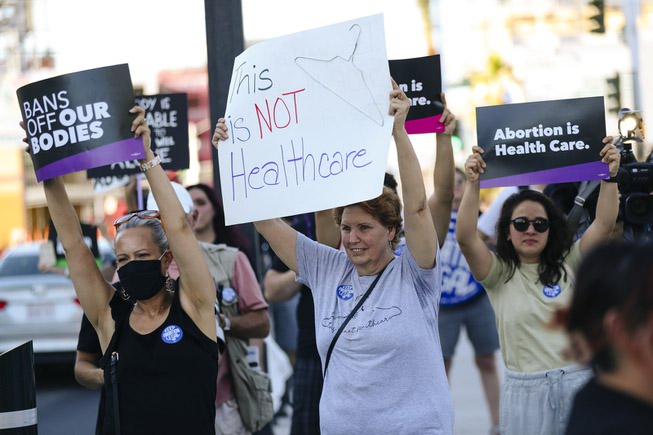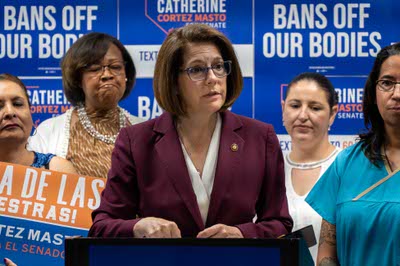
Abortion-rights demonstrators protest the U.S. Supreme Court’s decision to overturn Roe v. Wade during a rally outside the Federal Courthouse in downtown Las Vegas Friday, June 24, 2022.
Saturday, June 24, 2023 | 2 a.m.

Sen. Catherine Cortez Masto, D-Nev., speaks during a news conference at the Fuente de Vida Mental Health Clinic Friday, July 1, 2022. Masto talked about the recent Supreme Court decision repealing Roe v. Wade and denounced Republican challenger Adam Laxalt for his stance on reproductive rights. BRIAN RAMOS
Abortion in Nevada
Advocates for and against legal access to abortion in Nevada and across the country may not have much in common when it comes to women’s reproductive rights.
But since the Supreme Court reversed its ruling in the 1973 landmark case Roe v. Wade, those on either side of the issue agree on one point: Their respective work has just begun.
Today marks one year since the high court ruled 6-3 in the case of Dobbs v. Jackson Women’s Health Organization, in which a majority of justices determined the Constitution does not guarantee the right to abortion and allows individual states to determine the legality of the procedure in their own jurisdictions.
Since the ruling, trigger laws have gone into effect in nine states to ban abortion, and 25 measures have been enacted across the country to restrict access to the procedure.
Once the Supreme Court essentially told states to figure out abortion on their own terms, the race was on in Nevada and elsewhere to take action.
“What the Dobbs decision has done is made us all realize how important state legislatures are in the work that we do,” said Lindsey Harmon, executive director of Planned Parenthood Votes Nevada. “A single Supreme Court ruling kind of turned the world on its head, and that legal precedent was essentially thrown out when the Dobbs decision happened. We really had to take a comprehensive look at our state and find out what additional protections we could do.”
Even before the Dobbs ruling, states like Texas passed laws emboldening individuals to use civil courts to sue abortion providers, patients or anyone who would aid in facilitating the procedure. That was the first sign of what was to come, said Macy Haverda, president of the Wild West Access Fund of Nevada — a nonprofit that assists women with medical and travel costs associated with abortion.
The group started in June 2021 and consists of just a few dozen volunteers, Haverda said. Last year alone, the Wild West Access Fund redistributed nearly $77,000 across 322 pledges to cover clinical costs of abortion procedures, according to the group’s annual impact report.
“A lot of these laws are meant to cause mayhem and confusion,” Haverda said. “We now see a lot of travelers, and it changes every single week, but it’s something we offer as a service line for people to even get here.”
Harmon and other abortion rights advocates long warned overturning Roe was all but imminent after the September 2020 death of former Justice Ruth Bader Ginsberg. Her death allowed then-President Donald Trump to select Amy Coney Barrett and make good on a campaign promise to evangelicals to only nominate conservative judges to the nation’s highest court. But Harmon has also long maintained that Nevada would remain on solid footing to retain abortion access, thanks to decades of statutory protections.
Nevada voters in 1990 overwhelmingly approved a ballot measure enshrining the right to abortion through 24 weeks gestation into the Nevada Revised Statutes, meaning the policy could only be undone by a similar voter referendum. And in 2019, former Gov. Steve Sisolak signed into law the Trust Nevada Women Act, which removed most criminal penalties for abortion from from state laws that, in some cases, were enacted more than a century ago.
This month, Gov. Joe Lombardo became just the third Republican governor nationally to sign a bill into law enshrining abortion protections since the Dobbs ruling. Lombardo signed Senate Bill 131, which shields out-of-state patients and abortion providers from prosecution by states where the procedure has been outlawed — cementing a Sisolak executive order issued shortly after the Dobbs ruling.
The Nevada Legislature this year also passed Senate Joint Resolution 7, which seeks to amend the Nevada Constitution to guarantee access to abortion, as well as birth control, prenatal and postpartum care, vasectomies, tubal ligation, infertility care and miscarriage treatment. If SJR 7 passes the Legislature again in the 2025 session, it would be posed to voters as a ballot referendum for the 2026 general election.
Harmon cited internal data that Planned Parenthood locations in Nevada have seen roughly a 37% increase in patients who reside outside the state since the Dobbs ruling. She declined to share that data over concerns of patient privacy.
“It’s an attempt to safeguard folks who are traveling to our state that are receiving care and to protect the providers that are providing that care,” Harmon said of SB 131. “There’s still a lot of questions up in the air on how the law will play out in the long term, but I think Nevada has done as much as it can at this moment and in this time to provide protection.”
In 2020, when data was last available, 11,010 abortions occurred in Nevada, according to the Guttmacher Institute, a think tank aimed at expanding reproductive rights. That number has likely gone up since the Dobbs decision, said Melissa Clement, president of Nevada Right to Life.
“We’re hoping to eliminate the need for abortion,” Clement said. “And that means changing hearts and minds. And the first and foremost, that means subsequently changing laws.”
Because abortion remains accessible for the foreseeable future in Nevada, the Right to Life affiliate here has shifted its focus to connecting women to pregnancy crisis resources.
While Nevada Right to Life’s main focus is to convince expecting mothers to not go through with an abortion, Clement said her organization also helped connect women to services like free ultrasounds, newborn care packages and signing up for public assistance. She said the group’s services have been accessed more since the Supreme Court ruling because of women coming from out-of-state seeking abortions here.
Caroline Mello Roberson, the southwest regional director for NARAL Pro-Choice America, a political advocacy group that seeks expanded reproductive freedoms, estimates that roughly half of all abortion patients in Nevada have come from out of state.
Finding the actual number of out-of-state patients seeking abortions in Nevada can be difficult to determine for several reasons, Harmon said.
“A lot of patients aren’t disclosing where they’re coming from because they’re so terrified of being criminally prosecuted that they’re not willing to give up their home address,” Harmon said.
In April, Idaho Gov. Brian Little signed a law making it illegal for adults to help pregnant Idaho minors cross state lines without their parents’ consent for an abortion. The law, the first of its kind in the nation limiting interstate travel for abortion, is punishable by up to five years in prison. Missouri and Texas have similar legislation pending.
But even as the landscape for abortion access nationally looks dim, Nevada remains strong in guaranteeing access to abortion services.
“Nevada has been a shining beacon of hope for reproductive rights for a long time. And now we hold a really important role in that because we’re a part of a number of states who were very quick saying they support reproductive freedom,” said NARAL’s Roberson.
Roberson continued: “I’m really hopeful that some of these policies we’re working on will actually increase access to care so that we can meet the moment and give people the care they need.”
What’s next?
As states continue to navigate regulations after the Dobbs ruling, reproductive rights advocates continue to brace for further abortion restrictions.
A federal appeals court is mulling the Food and Drug Administration’s authorization of mifepristone, a drug that received FDA approval in 2000 and is one of two pills primarily used in medication abortion — which accounts for roughly half of all abortions in the U.S.
That case could ultimately land before the Supreme Court next year, leaving states like California to stockpile mifepristone in the event the FDA is forced to reverse its approval. Democrats in Congress have stressed that reversing mifepristone’s approval would gut the FDA’s approval process, undermining regulators’ ability to determine what’s safe and what isn’t.
The overturning of Roe, however, was likely one of the key factors in motivating voters in the 2022 midterms. States like Kansas and Michigan saw voters turn out to preserve abortion access, and Democrats largely withstood what was expected to be huge GOP gains in Congress.
In Nevada, Democratic U.S. Sen. Catherine Cortez Masto was able to fend off her Republican challenger en route to reelection by primarily focusing on upholding abortion protections federally and vowing to vote against any future potential national abortion ban.
“We are a proud pro-choice state,” Cortez Masto said in a floor speech Wednesday. “But even though Nevada is a safe place for women who need health care, far-right Republicans living outside my state are telling women, ‘No, sorry. We’re making it Illegal for you to go there.’ ”
Congressional Republicans have also used the abortion issue to stall key military promotions. Sen. Tommy Tuberville, R-Ala., has blocked at least 250 officer promotions since March in protest of a new Department of Defense policy that reimburses travel costs and leave for service members who seek abortion.
Sen. Jacky Rosen, D-Nev., told the Sun that the holdup had affected Nellis Air Force Base northeast of Las Vegas and was harming national security.
“For the past several months, Senator Tuberville has been blocking the promotion of hundreds of senior military officials, including some in Nevada, because he wants to roll back a policy that protects our service members’ rights to access reproductive care,” Rosen said in a statement. “As a result, the Vice Commander of the Air Force Warfare Center at Nellis Air Force Base, which oversees more than 13,000 military and civilian personnel, is unable to transition to his next duty assignment, and his replacement is unable to assume their duties and move their family to Las Vegas.”
Rosen is up for reelection in 2024, when abortion will almost assuredly be one of the most top-of-mind issues for voters, Roberson said.
And while next year’s elections will have high turnout because it’s a presidential election, the abortion issue is one of many factors to drive voters to the polls, both Roberson and Harmon said.
“I think they (voters) responded to that in the midterms election with their support of Sen. Catherine Cortez Masto in a year there weren’t the same anticipated wins Nevada has typically gotten,” Harmon said. “So I’m very proud to say we worked tirelessly to get Catherine Cortez Masto elected. It will be the same with Sen. Jacky Rosen. We are committed to preserving those Senate seats and the congressional makeup of this state so we can do everything humanly possible to prevent a national abortion ban.”
